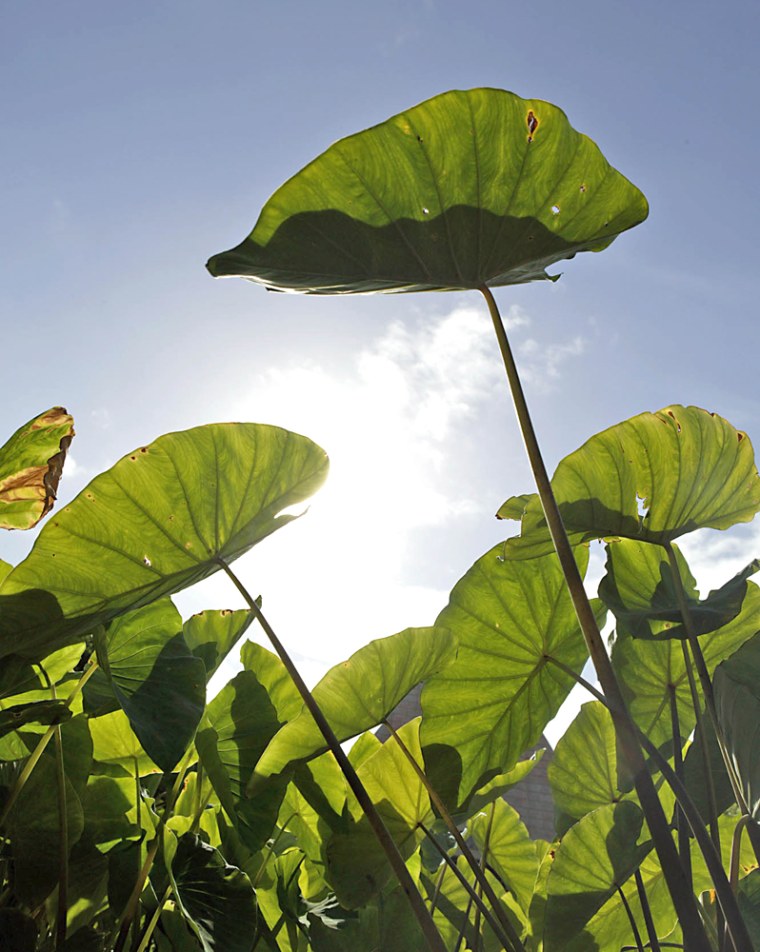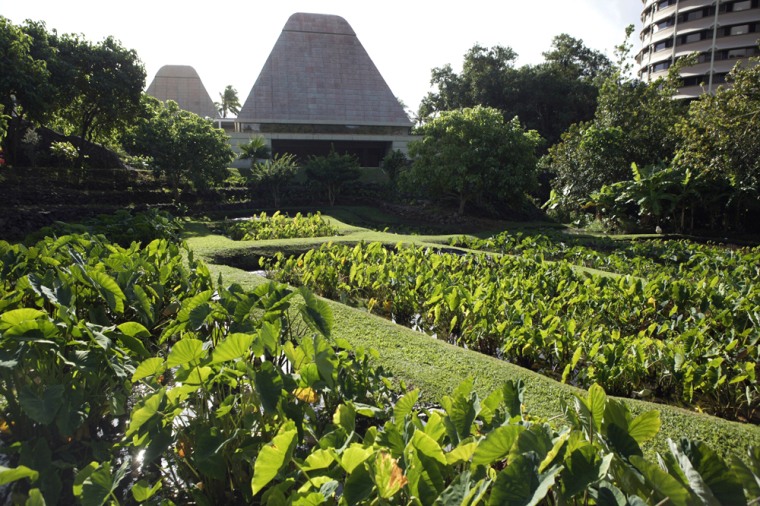On an idyllic spit of lush landscape at the University of Hawaii sprout the massive heart-shaped leaves of hundreds of taro plants.
Native Hawaiians hold the plant sacred in cultural lore, which is why many are now demanding that the university relinquish three patents claiming ownership to taro varieties developed by one of its scientists.
It’s just the latest collision between indigenous people and commercial interests over so-called biological prospecting, the growing practice of scouring the globe from the Amazon to the deep ocean for exotic plants, microbes and other living things with biological properties ripe for commercial exploitation.
A United Nations University report concluded that 62 percent of all cancer drugs were created from bioprospecting discoveries.
The patenting of such living things has exploded in the last few years from less than a dozen in 2000 to more than 100 last year, according to University of Hawaii researcher Stuart Donachie.
“There are things here worth looking for,” said Donachie, who has discovered five new bacteria on remote islands in the state. “They could provide something new that benefits society.”
The venom of a deadly sea snail found off the coast of the Philippines led Elan Pharmaceuticals to develop the painkiller Prialt, which the Food and Drug Administration approved in 2004.
The key ingredient in the breast cancer drug Taxol owned by Bristol-Myers Squibb Co. is taken from the bark of the yew tree and Wyeth’s kidney transplant drug Rapamune comes from Easter Island soil.
Such bioprospecting is on the rise and has huge potential for good, according to the researchers going to sea, climbing mountains and trekking to obscure corners of the world in search of exotic and undiscovered life.
The expeditions could ultimately make hazardous waste cleanup more affordable, reduce pollution and make better medicines — if genetic discoveries can be exploited and controlled.
Pharmaceutical companies view bioprospecting as an alternative for drug development to their traditional, chemistry-based manufacturing process.
Other companies are looking to nature for industrial applications such as using an enzyme found in deep sea vents to streamline ethanol production while still others are hunting Antarctica for useful microbes.
But tough ethical questions are being raised about allowing private companies to patent and profit from Mother Nature: Who owns the living thing that yields the revenue? Are companies simply pirating local knowledge and resources from indigenous people?
“With more pharmaceutical companies turning to exploring other new technologies as sources for new drugs, it is becoming increasingly clear that poor countries might never realize the full benefits of their genetic endowments,” the United Nations said in April prior to convening that month a meeting at New York headquarters of experts on the subject.
The area is mostly unregulated, especially in international waters, and there are mounting calls in the United States and the United Nations to establish legal frameworks for such work.
Legislation in the Hawaii legislature to ban bioprospecting has stalled, though lawmakers are expected to soon release an inventory of all bioprospecting agreements that the University of Hawaii has with industry.
The Convention on Biological Diversity has been ratified by 188 countries, but not the United States, and enforcement provisions appear weak, said Honolulu intellectual property attorney Seth Reiss.
A long history of colonialism in the remote bioprospecting hotspots of the world has also created mistrust of prospectors — even if most mining projects only involve scooping up a smidgen of DNA to tease out novel enzymes and proteins to make new products.
“We are taking spoonfuls or handfuls of dirt or water and we aren’t disturbing the environment or depleting the resources in any way,” said Martin Sabarsky, a spokesman with San Diego-based Diversa Inc., which has rights to mine University of Hawaii discoveries for novel genes.
“We are finding things that haven’t been found before and we think that adds value in many different ways,” Sabarsky said.
Diversa’s’ 15 bioprospecting endeavors around the world, including in Mexico, Ghana and Russia, have netted 200 patents with 500 more pending.
So far, though, the company has managed to get only one product — an animal feed supplement — to market.
Many locals accuse the University of Hawaii, which in 2003 began sending Diversa exotic microbes unearthed by researchers in volcanoes and elsewhere in the state, of giving away things that belong to the Hawaiian people and cannot be sold.
“It’s not about the money so much,” said Le’a Kanehe, a lawyer with the nonprofit group Indigenous Peoples Council on Biocolonialism. “It’s really about our relationship with the land. Our rights aren’t being recognized.”

Nowhere is the bioprospecting issue more contentious than in Hawaii, the most biologically diverse state in the country and home to more than 22,000 species of plant and animal. Close to 9,000 of those species are found only in Hawaii.
The patenting of the taro plants is just the latest dust-up between native Hawaiians and the school.
Eduardo Trujillo, the researcher who developed the three disease-resistant strains and patented them, said his work saved the sacred plant from devastation.
“The patents are intended to protect the new hybrid taro cultivars for exclusive use by our farmers,” Trujillo said in an e-mail reply to questions from The Associated Press.
According to Hawaiian legend, the cosmic first couple gave birth to a stillborn, Haloa, from whose gnarled body sprang the broad-leafed taro plant, whose roots also happen to yield one of Hawaii’s best-known foods — poi.
The Hawaiian people, it is believed, came from a second brother, making the taro plant part of their common ancestry.
“Our genealogy arises from the taro,” said Hawaii activist Mililani Trask. “The taro patents are a desecration.”
